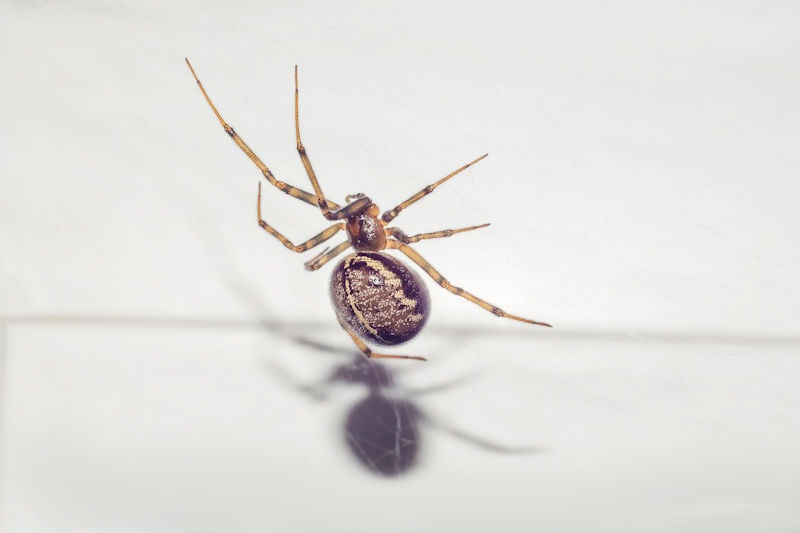Spiders are a common household nuisance that can cause significant discomfort for homeowners in Southern Maryland and Northern Virginia. Reducing conducive conditions that attract spiders is essential for effective spider prevention and maintaining a comfortable living environment. This essay outlines practical strategies to deter spiders from your home through humidity control, proper storage practices, outdoor maintenance, lighting adjustments, and household cleanliness.
Controlling Humidity
High humidity levels create an inviting environment for spiders, as many species thrive in damp conditions. Maintaining optimal humidity levels in your home can significantly reduce the likelihood of spider infestations. Here are some tips to help control humidity:
- Use Dehumidifiers: Dehumidifiers are effective tools for reducing moisture in the air, especially in basements and other areas prone to dampness. Regular use of dehumidifiers can help keep humidity levels in check.
- Improve Ventilation: Proper ventilation is crucial in reducing indoor humidity. Ensure that bathrooms, kitchens, and laundry areas are well-ventilated. Installing exhaust fans and keeping windows open when possible can improve airflow and reduce moisture buildup.
- Fix Leaks Promptly: Leaky pipes and faucets can create damp areas that attract spiders. Regularly inspect your home for leaks and repair them promptly to prevent moisture accumulation.
Proper Storage Practices
Cluttered storage areas provide ideal hiding spots for spiders. By organizing and decluttering storage spaces, you can make your home less attractive to these pests. Consider the following storage tips:
- Use Airtight Containers: Store items in airtight plastic containers to prevent spiders from finding shelter among your belongings. This is particularly important for items stored in basements, attics, and garages.
- Regular Cleaning and Organization: Regularly clean and organize storage areas to remove potential spider habitats. Dispose of unnecessary items and keep storage spaces tidy.
- Elevate Storage: Keep storage items off the floor by using shelves or pallets. This reduces the number of ground-level hiding spots for spiders.
Outdoor Maintenance
The conditions around your home’s exterior can greatly influence indoor spider presence. Proper outdoor maintenance can help deter spiders from entering your home. Here are some tips:
- Trim Vegetation: Overgrown vegetation and shrubbery close to your home can serve as a bridge for spiders to enter. Keep plants and bushes trimmed and away from the house.
- Remove Debris: Piles of leaves, wood, and other debris around your yard provide excellent hiding spots for spiders. Regularly clear debris to reduce spider habitats.
- Seal Entry Points: Inspect the exterior of your home for cracks and gaps, especially around windows, doors, and foundations. Seal these entry points to prevent spiders from finding their way inside.
Lighting and Spider Attraction
Outdoor lighting can attract insects, which in turn attract spiders looking for food. Adjusting your lighting strategy can help deter spiders:
- Use Yellow or Sodium Vapor Lights: These types of lights are less attractive to insects, which means fewer spiders will be drawn to your home.
- Position Lights Away from Entrances: Place outdoor lights away from doors and windows to minimize the number of insects (and subsequently spiders) near entry points.
Household Cleanliness
Maintaining a clean home is one of the most effective ways to reduce spider-friendly conditions. Regular cleaning disrupts spider webs and removes food sources. Prioritize the following tasks:
- Vacuum Regularly: Vacuuming is crucial for removing spider webs, egg sacs, and potential food sources like insects. Pay special attention to corners, under furniture, and other hard-to-reach areas.
- Dust Surfaces: Dusting helps remove spiders and their webs from surfaces. Use a damp cloth to capture dust and prevent it from becoming airborne.
- Wash Windows and Sills: Clean windows and sills regularly to remove spider webs and discourage spiders from settling in these areas.
Conclusion
Reducing conducive conditions for spiders involves a holistic approach that includes controlling humidity, organizing storage spaces, maintaining outdoor areas, adjusting lighting, and keeping a clean home. By implementing these strategies, homeowners in Southern Maryland and Northern Virginia can create an environment that is less inviting to spiders. Regular maintenance and vigilance are key to effective spider prevention, ensuring a comfortable and pest-free home.
FAQ
Q: How often should I use a dehumidifier to control humidity levels?
A: Use a dehumidifier regularly, especially in damp areas like basements. Monitor humidity levels and adjust usage as needed to maintain optimal conditions.
Q: What type of lighting is best for deterring spiders?
A: Yellow or sodium vapor lights are less attractive to insects, which helps reduce the number of spiders around your home.
Q: How can I keep my storage areas spider-free?
A: Store items in airtight containers, keep storage spaces organized and clean, and elevate storage off the floor to minimize hiding spots for spiders.
Q: What outdoor maintenance tasks are important for spider prevention?
A: Trim vegetation, remove debris, and seal entry points around your home’s exterior to reduce spider habitats and prevent them from entering your home.
Q: How often should I clean to keep spiders at bay?
A: Regular cleaning is essential. Vacuum and dust frequently, paying special attention to corners, under furniture, and other areas where spiders might hide.
NEED HELP?
If you live in Southern Maryland, or Northern Virginia
FIND YOUR SOLUTION HERE
People, Pet & Pollinator Safe! Pest control for people who care.
